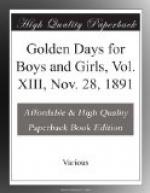Persons suffering from certain diseases, when sugar in any form cannot be taken, can have their diet rendered much more acceptable by the use of saccharine. The taste is very pure, and more quickly communicated to the palate than that of cane-sugar.
It seems wonderful that from a substance which, a generation ago, was used only as wagon grease and for kindling fires, such colors, medicines, perfumes and sweetness should be extracted!
BE SURE HOW YOU BEGIN.
by GEORGE BIRDSEYE.
“When once begun,
The work’s half done,”
So says the proverb old;
But even here,
You’ll see it clear,
The truth is but half told;
For wisdom says
There are two ways,
One loses and one wins;
You’ll find, young friends,
That all depends
Upon how one begins.
If wrong begun,
And work half done,
So much the worse for you;
If right—go on
Until you’ve won
The goal you had in view.
In life you gaze
Upon the ways
Of virtue and of sin;
Be led by truth,
And in your youth
Be sure how you begin.
ECLIPSES AND HISTORICAL DATES.
In a total eclipse of the sun the point of the shadow cone, which is constantly projected into space by the moon, touches a narrow strip of the earth’s surface, from which region alone the sun is totally obscured.
These total eclipses occur about three times in four years, but a total eclipse for any given region does not occur oftener than once in two hundred years.
It is therefore possible when an eclipse of the sun is described in connection with some remote historical event, and the hour is mentioned, to fix the period of the occurrence exactly.
Historical research is thus aided, and, to facilitate reference, Professor Von Oppolzer, Viennese Astronomer Royal, has, with the aid of ten assistants, fixed the date of 8000 eclipses of the sun and 5200 eclipses of the moon, extending over a period from 1200 B.C. to 2163 A.D., the calculations filling 242 thick folio volumes.
Two applications of these data may be cited. The oldest recorded eclipse, which occurred in China 4000 years ago, is mentioned in the Chinese book “Schuking” as taking place in the early morning, in the last month of harvest, in the fifth year of Emperor Tschung-hang’s reign. Other sources show that this reign was undoubtedly in the twenty-second century B.C., and the only eclipse that would apply took place on October 22, 2137 B.C.
It is recorded that Christ suffered in the nineteenth year of Tiberias, in which year the sun was darkened, Bithynia shaken and much of Nicea laid in ruins. One writer mentions that a total eclipse of the sun, lasting from the sixth to the ninth hour, occurred in the reign of Tiberias, during full moon, and another adds that it occurred on the 14th day of the month.
Now, an eclipse of the sun at full moon is impossible. Reference to Oppolzer’s work shows that the only total eclipse of the sun in that region, between eight years before our reckoning and 59 A.D., took place Thursday, November 24-29 A.D.




